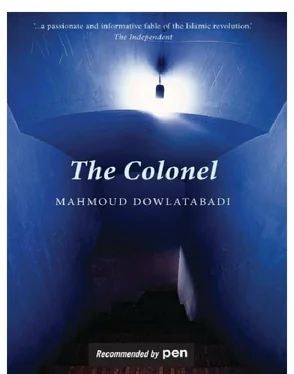
the colonel had opened the packet of sugar plums and held them out in front of Abdullah’s scorched face and crazed eyes. But presently he felt himself to be quite alone on the verandah. He could no longer hear Abdullah’s snuffling breath. He had gone… But no — he was still there after all. A misplaced curiosity drew the colonel towards the dark corridor, towards the misshapen, deformed creature standing, rock-like, under the canary’s cage. Its mismatched eyes, one blue, the other yellow, glowed in the dark like a jungle cat’s. It seemed to be speaking:
“I’m dumb, colonel, I can’t speak.”
“So am I, my son — but now I have things to do.”

When the colonel reached the main square, he saw a large crowd moving along. In the darkness and the rain, he could not make out a single clear face. All he could see were their gaping mouths, baying fearsomely, and their terrifying hypnotised eyes. They seemed to be high on some lethal drug, but the colonel saw no need to be afraid, for there was nothing left in him for that drunken mob to destroy. What was there to fear now? Anyway, I want to hand out those sugar plums to them.
He opened the packet and held the coloured sugar plums out to the eager hands stretched towards him. They grabbed the sweets and stuffed them into their mouths. They would bring blessings on the show that was about to start. Shouting ‘Good Luck!’ at him, they parted and cleared a way for the colonel to get through to the centre of the square, where the show was about to take place.
I’m not surprised, not in the least surprised!
The accused had been made to sit down on the wet cobblestones, like prisoners of war. Some of them, it appeared, had already been sentenced and had punishment meted out to them. Amir Kabir, who stood out from the others, had been made to kneel in the mud. In the centre stands The Colonel, erect as ever.
It was all like some nightmarish old historical panorama, rendered in shades of grey and black, with a landscape in the background shrouded in mist and rain. Even the blood — on The Colonel’s throat, flowing from the vein in Amir’s arm, pouring from Heidar’s heart and Sattar Khan’s leg — was grey. 59
Grey also was the blanket they had wrapped round Mossadeq’s shoulders. The only colour came from some bright red vertical lines in the left-hand edge of the painting, where a man with a red scarf round his neck was hanging from a red gibbet. 60His glasses had been shattered, but were still on his nose, and he was completely naked. The clear intention was to humiliate him. Unseen hands kept pushing his dangling body this way and that, so that it was lit from all sides by the glare of the spotlights. His naked body was just a bag of skin and bones, indicating that he had spent his youth locked up in damp and stinking jail cells. It was hard to see why the authorities were so insistent on publicly disgracing and torturing this man, as the performance did nothing to stop his mother from weeping and crying incessantly in Azeri: “ Men evladimi tanimirem, bu men evladim deyir. Onu mene görsetin! ” 61
This appeal has no effect whatsoever on the tyrant Hajjaj bin-Yousef Qorbani. He is bent on wiping these people out, and he has no intention of letting her Azeri gibberish penetrate his Arab brain.
His particular speciality lies in that, before violating the honour of a nation through its women, first he shits on them and then makes them eat each other alive, just like Morshed Kabir in Safavid times, and then he throws the last of them to the hyenas of the Dead Sea deserts to the north, who have been driven over here, like an unwanted gift. 62It was absurd to expect Hajjaj Yousef Qorbani to be moved by the lamentations of an Azeri mother on her knees before the naked body of her son, wailing that she could not recognize him and begging the hangman to show him to her: “ Musulmanlar, Musulmanlar, bu ki var menim evladim deyir. Taqi, Taqi… Ana !” 63
Another speciality of Qorbani Hajjaj Yousef ’s is to allow his victims — after they have denounced themselves — to choose how they want to be put to death. But on one condition — the victim’s decision must be announced over the loudspeakers by the colonel, who is to be the spokesman of his son-in-law. The colonel heard his own voice echoing over the square: ‘Praise be to Allah, there are many different forms of punishment, some two thousand four-hundred odd, each one designed for a specific crime.’ Qorbani, after the usual obsequious preambles praising the authorities, then listed the various crimes the prisoners were accused of.
At that moment, the colonel’s gaze lighted on old Mossadeq, who was still sitting on the floor, wrapped in his old army blanket, with his right knee raised. The point of his walking stick was stuck in the ground, with the crook of it resting between his shoulder blades to support his back. He held his head down, looking at the ground. He looked like a dejected shepherd whose flock has been attacked by a pack of wolves. A knowing, distant smile played around his lips. Khezr’s ghostly face can just be made out in the mist.
Now it was Heidar Amoghli’s turn: as a snowstorm began swirling over the square, he held the cold barrel of Mirza Kuchik’s rifle against his heart and, standing there next to the kneeling Sattar Khan and Sheikh Khiabani, 64gave Mirza the order to fire.
Then The Colonel appeared, holding his head and bloodied astrakhan cap above his head like a lantern. And finally it was the turn of the great Amir Kabir. Calm and grimly silent, he knelt down where he stood, as if on a prayer mat, or facing an execution block, bracing himself with his hands on the cold cobbles and looking at the ground. He seemed not to notice the brownish blood seeping out of his forearm. He is holding a eulogy in one hand, perhaps for the great Qaim Maqam… 65 65He is looking down as Qorbani Hajjaj appears, clutching a dagger still greyish-red from the blood of Dadviyeh. 66His sleeves are rolled up, and the folds of his cloak are girt up. The bands that hang down three sides of his pointed steel helmet are adorned with glittering rubies and emeralds. His bare, ugly feet are covered in mud and blood up to the ankles. Standing beside Amir, he speaks from the back of his throat, spraying out spittle with every word. With a string of foul imprecations, he lambasts him as a criminal of the first order and then asks him how he wishes to be executed. Without deigning to look up at him, Amir gives the order himself: “Off with my head!”
How could anyone take pleasure in the curve of a sabre in this savage method of separating a body from its head, still less when it is kneeling down with its palms nailed to the ground? It’s a ghastly form of revenge .
the colonel recalled that when criminals were hanged in the old days in Execution Square or Artillery Square, people would scatter coins at their feet by way of expiation. There was something disgusting and self-abasing about the whole performance, for what they were really doing was trying to purge themselves of complicity in the act.
Without thinking, the colonel takes the last few sugar plums out of the packet and, like a farmer scattering seed, strews them over the bloody pile of severed heads. The world goes dark in front of him and, in the depths of the darkness, all he can see is the tall, upright figure of The Colonel holding his head high above him, blazing like a torch.
His head was still spinning as he lifted up his forehead from the cold cobblestones in the square. He hesitated and then, with some trepidation, opened his eyes. The rain had stopped and the square was empty. There was just the echo of marching boots on the bare flagstones. The whole square was spattered with blood. Looking up, he saw a procession, led by The Colonel, of the great men marching out of sight, each one holding his head under his arm. Their old field boots gleamed in the light of the street shrines erected in memory of their sons, and in the light of the flame that was The Colonel’s head, held high above them all.
Читать дальше














